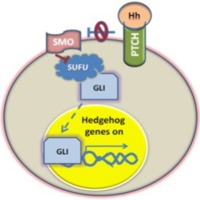Novel Agents for the Treatment of Pancreatic Adenocarcinoma
Abstract
There are urgent needs to develop novel and more effective regimens to improve outcomes of pancreatic cancer given its dismal prognosis and limited treatment options. Several phase I clinical trials involving novel agents were recently presented at the 2011 American Society of Clinical Oncology (ASCO) Annual Meeting. It appears that hedgehog inhibition with IPI-926 was well-tolerated and might be effective in treating pancreatic cancer when combined with gemcitabine. The survival benefits will be tested in the following randomized phase II trial. The new combination of gemcitabine and blockade of checkpoint kinases with AZD7762 showed an acceptable safety profile. Furthermore, inhibition of PI3K by BAY80-6946 was well tolerated with PET-CT suggesting reduction in FDG uptake in some pancreatic cancer. The benefits of above novel agents/regimens need to be further tested in phase II trials.
Image: Hedgehog pathway (cancer cell)
Downloads
References
Hidalgo M. Pancreatic cancer. N Engl J Med ; 362:1605-17.
Kim R. FOLFIRINOX: a new standard treatment for advanced pancreatic cancer? Lancet Oncol 2011; 12(1):8-9.
Hidalgo M, Maitra A. The hedgehog pathway and pancreatic cancer. N Engl J Med 2009; 361:2094-6.
Jones S, Zhang X, Parsons DW, Lin JC, Leary RJ, Angenendt P, et al. Core signaling pathways in human pancreatic cancers revealed by global genomic analyses. Science 2008; 321:1801-6.
Olson P, Hanahan D. Cancer. Breaching the cancer fortress. Science 2009; 324:1400-1.
Tremblay MR, Lescarbeau A, Grogan MJ, Tan E, Lin G, Austad BC, et al. Discovery of a potent and orally active hedgehog pathway antagonist (IPI-926). J Med Chem 2009; 52:4400-4418.
Olive KP, Jacobetz MA, Davidson CJ, Gopinathan A, McIntyre D, Honess D, et al. Inhibition of Hedgehog signaling enhances delivery of chemotherapy in a mouse model of pancreatic cancer. Science 2009; 324:1457-61.
Von Hoff DD, LoRusso PM, Rudin CM, Reddy JC, Yauch RL, Tibes R, et al. Inhibition of the hedgehog pathway in advanced basal-cell carcinoma. N Engl J Med 2009; 361:1164-72.
Rudin CM, Hann CL, Laterra J, Yauch RL, Callahan CA, Fu L, et al. Treatment of medulloblastoma with hedgehog pathway inhibitor GDC-0449. N Engl J Med 2009; 361:1173-8.
Stephenson J, Wolpin BM, Becerra C, Hamm JT, Messersmith WA, Devens S, et al. The safety of IPI-926, a novel hedgehog pathway inhibitor, in combination with gemcitabine in patients (pts) with metastatic pancreatic cancer. J Clin Oncol 2011; 29(Suppl.):4114.
Rudin AJ, Miller WH Jr., Eigl BJ, Gettinger SN, Chang AL, Faia K, et al. A phase I study of IPI-926, a novel hedgehog pathway inhibitor, in patients (pts) with advanced or metastatic solid tumors. J Clin Oncol 2011; 29(Suppl.):3014.
Garrett MD, Collins I. Anticancer therapy with checkpoint inhibitors: what, where and when? Trends Pharmacol Sci ; 32:308-316.
Zabludoff SD, Deng C, Grondine MR, Sheehy AM, Ashwell S, Caleb BL, et al. AZD7762, a novel checkpoint kinase inhibitor, drives checkpoint abrogation and potentiates DNA-targeted therapies. Mol Cancer Ther 2008; 7:2955-2966.
Sausville EA, Carducci MA, Barker PM, Agbo F, Oakes P, Senderowicz AM. Phase I dose-escalation study of AZD7762 in combination with gemcitabine (gem) in patients (pts) with advanced solid tumors. J Clin Oncol 2011; 29(Suppl.):3058.
Falasca M, Selvaggi F, Buus R, Sulpizio S, Edling CE. Targeting phosphoinositide 3-kinase pathways in pancreatic cancer - from molecular signalling to clinical trials. Anticancer Agents Med Chem 2011; 11:455-463.
Parsons CM, Muilenburg D, Bowles TL, Virudachalam S, Bold RJ. The role of Akt activation in the response to chemotherapy in pancreatic cancer. Anticancer Res. 2010; 30(9):3279-89.
Sun C, Rosendahl AH, Andersson R, Wu D, Wang X. The role of phosphatidylinositol 3-kinase signaling pathways in pancreatic cancer. Pancreatology. 2011; 27:252-60.
Yao R, Cooper GM. Requirement for phosphatidylinositol-3 kinase in the prevention of apoptosis by nerve growth factor. Science 1995; 267:2003-6.
Yuan ZQ, Sun M, Feldman RI, Wang G, Ma X, Jiang C, et al. Frequent activation of AKT2 and induction of apoptosis by inhibition of phosphoinositide-3-OH kinase/Akt pathway in human ovarian cancer. Oncogene 2000; 19:2324-2330.
Hu L, Hofmann J, Lu Y, Mills GB, Jaffe RB. Inhibition of phosphatidylinositol 3'-kinase increases efficacy of paclitaxel in in vitro and in vivo ovarian cancer models. Cancer Res 2002; 62:1087-1092.
Patnaik A, Mountz JM, Ramanathan RK, Beeram M, Tolcher AW, Papadopoulos KP, et al. A first-in-human phase I study of intravenous PI3K inhibitor BAY 80-6946 in patients with advanced solid tumors: Results of dose-escalation phase. J Clin Oncol 2011; 29(Suppl.):3035.
Testa JR, Tsichlis PN. AKT signaling in normal and malignant cells. Oncogene 2005; 24(50):7391-3.

Copyright (c) 2015 Haiying Cheng, Eirini Merika, Kostas Syrigos, Muhammad Wasif Saif

This work is licensed under a Creative Commons Attribution 4.0 International License.
As a member of Publisher International Linking Association, PILA, iMedPub Group’s JOP follows the Creative Commons Attribution License and Scholars Open Access publishing policies. Journal of the Pancreas is the Council Contributor Member of Council of Science Editors (CSE) and following the CSE slogan Education, Ethics, and Evidence for Editors.